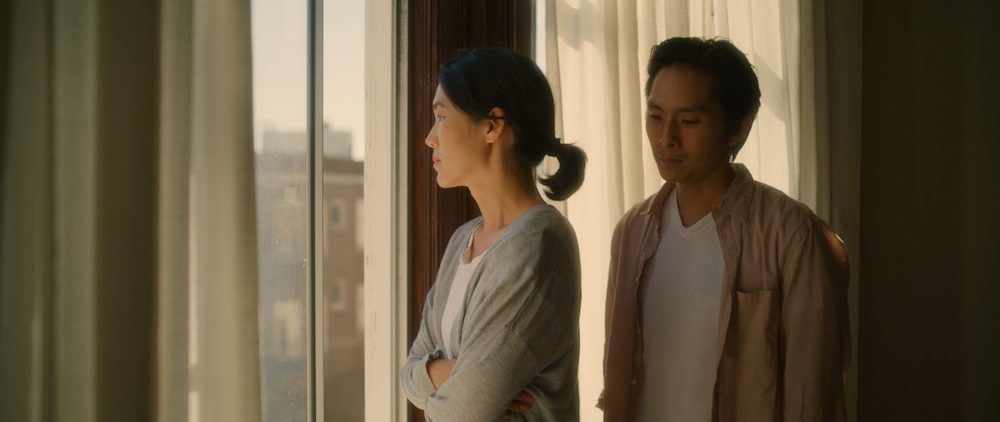“The meat needs to be connected to the bone to borrow its richness,” explains the son at the center of Wayne Wang’s “Coming Home Again”—based upon Chang-rae Lee’s eponymous short story. Set in San Francisco, the film opens to Chang-rae (Justin Chon) preparing a Korean beef dish for his mother for New Year’s—meticulously following her recipe. His mother (Jackie Chung) lies attached to IVs in a small bedroom, adjacent to the kitchen. She has stomach cancer, and Chang-rae has left his writing job in New York to care for her.
“Coming Home Again” is a distant yet confined study in repressed emotions—the “Joy Luck Club” filmmaker routinely places Chon within tight natural frames. Deep personal trauma remains on a low simmer between Chang-rae and his mother. Having left years ago to attend a private school, he’s lived removed from his parents. His mother doesn’t even know his girlfriend’s name. That time apart, and her illness, ignites Chang-rae.
From his memories with his mother we learn hints of her ebullient personality—her aptitude for basketball and sarcastic sense of humor—and her insecurities: fear that her son is ashamed of her education in lieu of sophisticated friends. Nevertheless, his ritual adherence to her recipes is a study of grief. The closer Chang-rae follows her instructions, the less he feels responsible for the lost time, the rejection of her. And during the quiet spaces of the day, he cares for her: changing her fluids, cleaning her vomit, helping her to the bathroom, and by preparing her dinner. The stillness of the time also induces flashbacks by him; the cinematography and lighting enlivens the viewer’s eyes, relying on golden warm tones and intimate, handheld close-ups during past events, and cool tones and wide lenses for the somber present. Chon’s voiceovers also point to hidden conflicts, intimating a past affair by his father and thinking upon a sister who’s not returned for years.
Taking inspiration from Ozu, Wang plants several quiet scenes for deeper characterization, like Chang-rae’s mother polishing her nails, trying on a wig, demanding to use the bathroom under her own power, or lying on the couch and humming a melody. “It’s funny how a good song can turn bad,” she remarks. In a gut-wrenching close-up later in the film, his mother finally tastes the beef he has spent the day preparing—the compressed sounds of grief reverberate.
Chung’s performance here is incredible. Her face falls and rises from happy to dejected to reassuring, while her character struggles from vomiting, holding back tears as her face swells red. Chang-rae’s stoic wall finally crumbles, a cathartic release for a son not ready to say goodbye in a stunning overflow of emotion. The 86-minute “Coming Home Again” concludes by echoing “No Country for Old Men,” as Chang-rae recounts a dream. On a lonely winding path in the hills, he drives past a car on the side of the road. Two figures are there: his parents. He does not know whether they are laughing, crying, or hugging. He just knows that he can’t stop driving back, and nor can we ever leave Wang’s meditative “Coming Home Again.”

William Nicholson’s “Hope Gap” also pictures loss. A voiceover opens the middle-age divorce drama, recounting the custom of soldiers leaving their near-dead comrades behind for survival. The film follows Edward (Bill Nighy) and Grace (Annette Bening)—a miserably matched couple at a crossroads in their lives, avoiding truths and doldrums, inciting reactions from each other’s catatonic passivity. Their only commonality is their son Jamie (Josh O’Connor), who rarely visits his parents, especially his mother. Nevertheless he arrives to find shocking news: Edward’s has a new flame named Angela, an unhappy single mother. He’s decided to sever his marriage with Grace and enlists the help of Jamie to ease her grief.
“Hope Gap” doesn’t offer much in the way of startling direction or camerawork. It’s solely dependent upon the three leads molding familiar material into worthwhile substances. In most instances, there’d be little reason to empathize with Grace. She’s batty; a stringent and stern woman, self-absorbed and demanding. But even with a rocky English accent, Bening imbues her with pathos: a character who’s afraid of living the next day without love as she mourns a dead marriage.
As for Nighy, he enriches Edward. Without him, Edward would only display the dread of a man whose execution was delayed by five minutes. His reasoning for leaving needlessly repeats: He was never right for Grace, she expected too much, and Angela loves him for him. Through his beguiling contortions and his therapeutic voice, Nighy allows Edward to appear sage and fascinating, even if in the script he’s not.
And then there’s Jamie, a regular tabula rasa for his parents’ distresses and desires. He spends “Hope Gap” reconnecting with his obtrusive and needy mother, confronting their contentious relationship. O’Connor sometimes appears miscast and overmatched, even in scenes with the passive Nighy. During “Hope Gap”s Q&A Nicholson asked the audience which parent they ultimately supported: Grace or Edward? The response was dead even. The varied interpretations stem from Bening and Nighy’s performances. While Nicholson’s film is autobiographical—Jamie is based on him—we’ve seen stories like “Hope Gap” before: the existential dread of losing love late in life, knowing love now hides itself like a four-leaf clover, accomplished with greater clarity and depth in works like “Gloria Bell” and “Enough Said.” Unfortunately for Nicholson, Bening and Nighy aren’t enough to fill what’s missing.

Italian filmmaker Chiara Malta’s feature directorial debut “Simple Women” opens with an Italian family watching the downfall of dictator Nicolae Ceausescu on television—their daughter Federica sits at their dinner table eating cake. Seeing the despot’s assassination by firing squad, Federica suffers an epileptic seizure. Years later, she becomes obsessed with Hal Hartley’s “Simple Men”—especially the film’s lead actress Elina Löwensohn, whose character suffers from epilepsy. In fact, she’s never forgotten the rush of watching Löwensohn’s Elina dance to Sonic Youth’s “Kool Thing,” the thrill of running to the cinema and seeing herself represented on screen.
Over the course of “Simple Women”‘s 80 minutes, Malta plays with her audience and deconstructs the idolatry of celebrity. As an adult, Federica (Jasmine Trinca) bumps into Elina on the streets of Italy. She pitches to the Romanian actress an audacious idea: to play herself in a film set in Bucharest about her life. And while Federica is a near-psychophant, Elina is in a career slump—relegated to playing a background patient on television. She toys with her dedicated, possibly only fan by mocking her. Trinca, in a subtle performance, displays Federica’s unique blend of clumsiness and creativity. Malta further tears down the idea of Elina that Federica’s created, pushing her to her natural vulnerabilities. Language—spoken or cinematic—further drives director and actress apart. Though both Federica and Elina speak English, Federica often switches to Italian and Elina to Romanian. Also, the making of Federica’s film suffers through starts and stops, and when she asks Elina to bend the accuracy of her father’s death in lieu of a more dramatic scene, Malta obliterates the existence of truth.
The film combines reality and magical realism through omens and seers. During one scene, a young actress breaks a mirror causing Federica’s production to fall behind. In another, Elina meets with a fortune teller who warns her against trusting the young director. In another, the seer warns Federica against trusting Elina. Employing guerilla filmmaking and inexperienced extras, her abilities come under scrutiny too. Worse yet, Elina is an unreliable narrator to her own life stories, feeding her director with an outlandish tale of wild strawberries.
“Simple Women” whips into a swirling fable in its audacious final 15 minutes. Federica and Elina’s memories meld together—they even dress the same; and there’s no cut or action, no bounds between reality and fiction. Malta toys with the viewer: Is Elina quitting production? Is the fictional director going mad? A fever dream helplessly tosses Federica into her memories, running between rooms of a hospital, confronted by figures in her life much like Guido’s in “8 ½.” The final reveal—as if a heavenly glow of star dust and dreams were combined—can’t be predicted. “Simple Women”‘s final cathartic fable—its demolition of celebrity—doesn’t fully mesh together as Malta becomes a victim of losing narrative, but the breathtaking risk she takes makes her feature debut an incredible opening statement.












